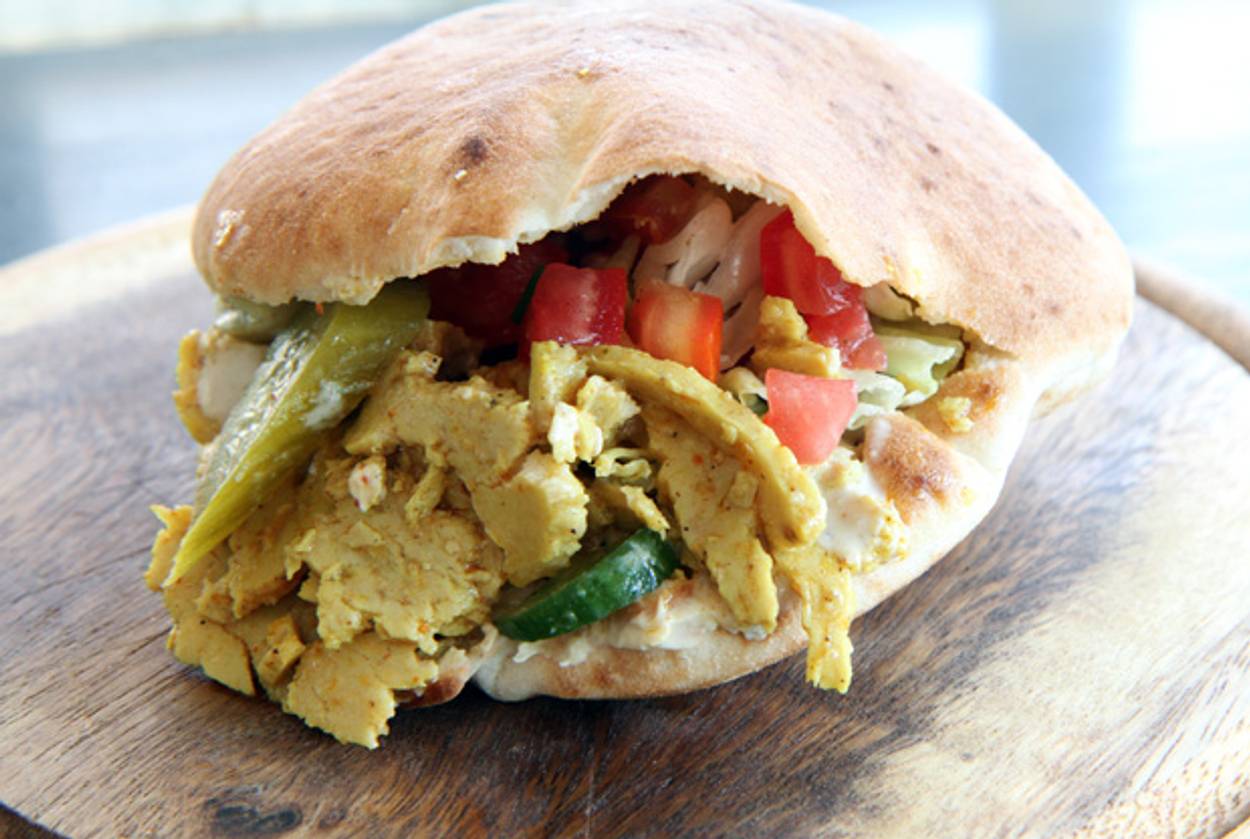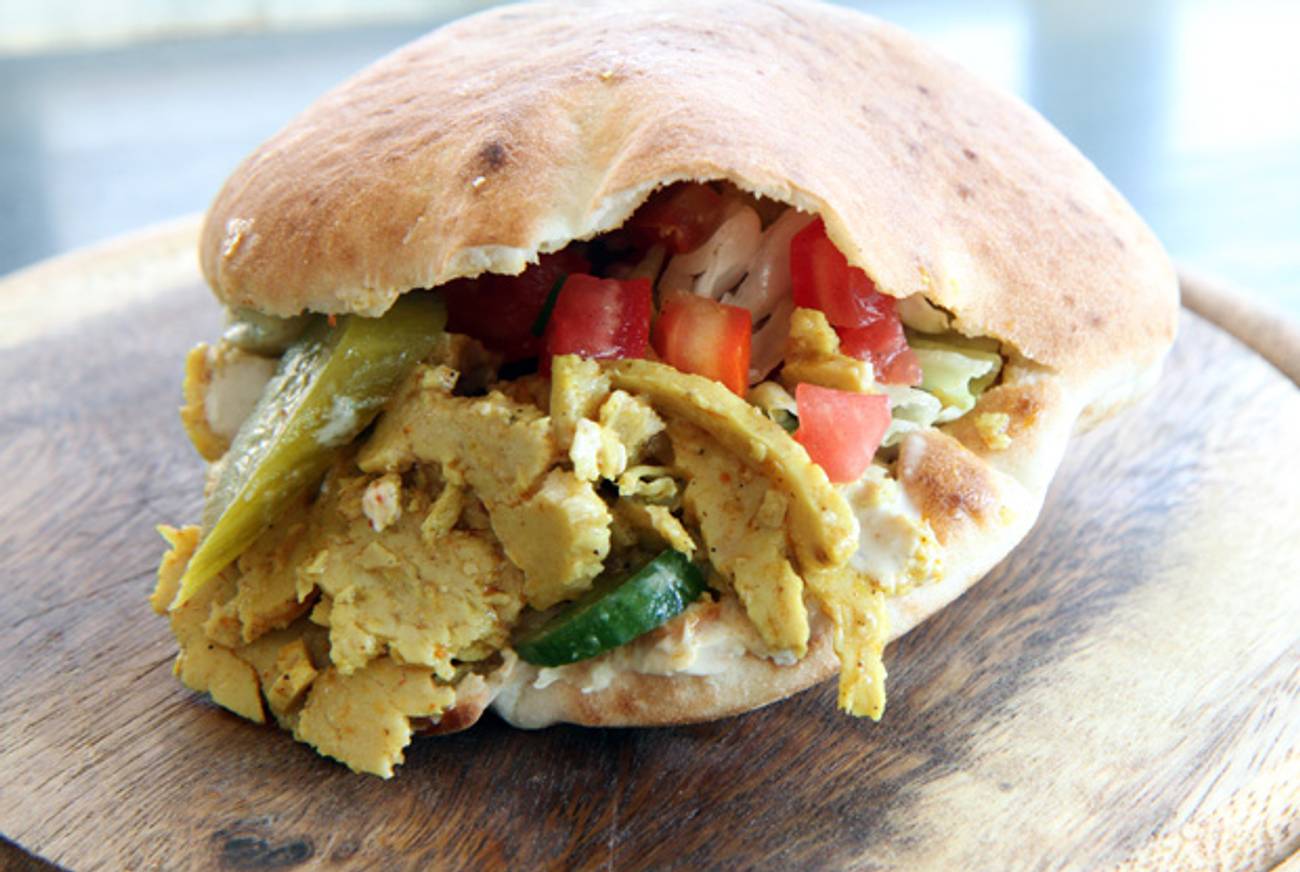Israel Goes Vegan
As animal-free eating catches on, restaurants, websites, and cooking classes reflect the latest food trend




The latest culinary trend to sweep the land of milk and honey is total abstinence from both. Veganism—refraining from all meat and animal products, including dairy, eggs, and even honey—is taking off in Israel, where few people had even heard of the term a few years ago.
Animal-rights organizations such as Anonymous (no connection to the hackers) and Let the Animals Live have operated for more than two decades, and there have always been vegetarians in Israel; there even is a vegetarian moshav called Amirim, founded in the 1950s in the Galilee. But while vegetarians, who avoid eating meat, are pretty common in Israel, abstaining from eggs and dairy products has been perceived here as an esoteric practice adopted by health-freaks or high-school radicals.
It’s true that Israeli cuisine contains quite a few individual dishes that have become vegan favorites around the world—such as falafel, hummus, and tabbouleh—but it’s also true that Israelis love meat. No Shabbat dinner is considered complete without chicken, and Yom Ha’atzmaut—Israel’s Independence Day—is typically celebrated by family barbecue outings. So, how did the vegan craze hit Israel’s shores?
By most accounts, it all started in April of last year, when Daniel Erlich and Hovav Amir, two animal-rights activists who run the online TV show Animal Log, added Hebrew subtitles to an American lecture about veganism and posted it on YouTube under the title “the best speech you’ll ever hear.” The lecturer is a Jewish American animal-rights activist named Gary Yourofsky, who usually speaks to high-school and college students in the United States. He is considered a criminal or even a terrorist by many, is banned from entering Canada and the U.K., and has a long history of arrests. He even spent 77 days in a Canadian maximum-security prison once, after raiding a fur farm.
Yourofsky doesn’t hesitate to use shock-tactics: He calls eggs “chicken period” and honey “bee vomit,” and frequently advocates violence. Yourofsky once told the animal-rights magazine The Abolitionist: “Every woman ensconced in fur should endure a rape so vicious that it scars them forever. While every man entrenched in fur should suffer an anal raping so horrific that they become disemboweled.” While his YouTube video is less extreme than that, Yourofsky’s angry speech would probably cause any hamburger-eater to feel terribly guilty. In it, he combines statistics, nutrition information, and discussions of morality, interspersed with shocking films of slaughterhouses (there is also a censored version on YouTube without those bits). Although Google will easily provide you with essays that contradict every one of his claims, being the charismatic and experienced speaker that he is, Yourofsky can easily convince viewers that some of his not-so-accurate statements are proven facts.
News of the eye-opening lecture spread virally and with the help of activists handing out leaflets. Erlich and Amir even got a leading tofu manufacturer to print a QR code on tofu packages linking to the Israeli Yourofsky site. More than half a million Israelis have watched the YouTube video. Many others attended, and keep attending, screenings at universities, schools, and various public places around the country, and last September Yourofsky himself held a successful lecture tour in Israel—his first outside the United States—which was accompanied by much media coverage. Erlich and Amir can now boast that more than 700,000 Israelis, close to 10 percent of the country’s population, have heard Yourofsky’s gospel.
“I think that experts on the Israeli vegan scene will agree to the estimate that at least a few thousands have become vegan after watching Gary’s speech,” Amir told me in an interview.
It was clear that veganism entered the Israeli mainstream the moment it hit prime-time TV. In July, Channel 2 news aired a story about thousands of Israelis going vegan after watching Yourofsky’s speech, among them a few celebrities, like singer Achinoam Nini (known outside Israel simply as Noa), who said the speech “rattled the foundations of her soul,” and radio personality Eli Israeli. TV presenter and ex-anchorwoman for Channel 10 news Miki Haimovich is a longtime vegetarian who is on her way to becoming vegan, and these days she is using her immense public influence to promote “Meatless Monday”—an international campaign that encourages people not to eat meat on Mondays. As with all trends, timing is crucial, and Israel’s vegan craze can easily be traced back to the social justice movement that took over the country during last year’s protests.
Now the signs of Israel’s vegan revolution are everywhere. There are vegan cooking courses and workshops, vegan blogs, online vegan cooking programs, a new smartphone app called Vegan Spotting that locates vegan dishes served in your area, and a slew of new businesses that cater to vegans, like an online vegan shop selling everything from vegan pet food to vegan condoms. Vegan Friendly is a new initiative making the vegan lifestyle in Israel easier and more accessible by identifying vegan restaurants, cafés, hotels, and other establishments. Like other vegan groups, Vegan Friendly promotes itself on Facebook, which hosts many other Israeli vegan groups. There even is a Facebook page for Israeli vegan parents looking for help figuring out what to feed their kids.
The truth is that becoming vegan in Israel is relatively easy; many Mediterranean foods are plant-based anyway. And kashrut helps, too: Kosher products marked as “pareve” are usually suitable for vegans, as this label classifies the product as neither milk nor meat—although vegans should still check the ingredients because pareve products may contain eggs, fish, or honey. However, one of the main challenges of being vegan in Israel, as it is anywhere, is eating out.
Apart from a restaurants like Taam Ha-Chaim (Taste of Life), run by the Black Hebrew Israelites, and the organic-vegan restaurant Aba Gil—both in Tel Aviv—there haven’t been many strictly vegan eateries in the country. But that is beginning to change. A new chain called Vegetarian Shawarma (which sells strictly vegan shawarma made out of the popular meat substitute seitan, which is wheat gluten) recently joined the vegan-hamburger chain Buddha Burgers. And while Buddha Burgers has branches in Tel Aviv and Raanana, Vegetarian Shawarma started in the southern city of Beersheva and spread to Tel Aviv and Haifa, while more branches are on their way. “We believe it’s possible to mix ideology with business,” explained Kobi Yafe, co-owner (with Yair Bellhasan) of Vegetarian Shawarma. And they are not the only ones who believe that. A new vegan catering service called Nectar opened recently, and more vegan restaurants are on the way.
Still, as with any trend, there will always be people opposing it, especially when the person leading it is Yourofsky, whose harsh words, and the fact he doesn’t hesitate to compare slaughterhouses to Auschwitz, raise hackles with certain people. They might not be anti-vegan, but they certainly oppose the attention the issue is getting in the media, believing that there is no place to talk about animals in a conflict zone like Israel and claiming it’s ridiculous to invest so much energy in animal rights in a country where human rights are still a sensitive issue.
While Yourofsky’s militant rhetoric might be off-putting, Israeli veganism has another, friendlier face. Restaurant critic Ori Shavit used to be a self-professed carnivore with a huge appetite for meat and seafood until she watched Yourofsky’s speech 16 months ago. She became vegetarian immediately, and it took her no longer than two weeks to go all the way to veganism. “There is something in [Yourofsky’s] simplicity and directness that evidently touches Israelis,” Shavit told me in an interview. “Israelis immediately connect to his way of communication, because he tells it like it is. I think Israelis in general are open-minded and curious and aren’t afraid of change. Maybe it has something to do with the fact that we’re still a young nation that is growing and evolving.”
For Shavit, going vegan meant not only a dietary change, but also a career change—obviously a restaurant critic who can’t taste the steak isn’t very useful. But luckily, Shavit has found publications interested in articles about vegan cuisine, and she also runs the popular blog Vegan Girls Have More Fun, which offers a comprehensive Israeli vegan dining guide in English.
Not wanting to change her lifestyle completely, Shavit went on a public mission to get the chefs of her favorite gourmet restaurants to incorporate vegan dishes in their menus. Seeing the good responses and positive publicity they received, they continued cooperating with Shavit and creating special vegan nights and pointing out vegan options in their regular menus. Thanks to Shavit’s enthusiasm, veganism is continuing to spread in Israel. “Not a day goes by without something new happening in the field of vegan culinary,” she said, the latest being a campaign to cancel the additional three shekels that most cafés in Israel charge if you wish to substitute soy milk for regular milk in your coffee. “The Aroma-Israel chain, for instance, which operates 117 branches around the country, just launched a new menu with vegan options, introduced tofu to all their branches, and stopped charging an additional fee for soy milk.”
Shavit believes that veganism in Israel is here to stay: “I don’t think veganism is a passing trend,” she said. “Veganism is a culture, a way of life, and a worldview. After achieving a deeper understanding of the vegan agenda, very few go back.”
Erlich and Amir, the two men who started this whole thing, are also optimistic, but maybe a bit more realistic: “This is not a passing trend, but we aren’t witnessing a real revolution,” said Amir. “Unfortunately, most people, unless they will be forced to do otherwise, will continue to consume products that cause inconceivable suffering for other creatures that never caused them any harm.”
***
Like this article? Sign up for our Daily Digest to get Tablet Magazine’s new content in your inbox each morning.
Dana Kessler has written for Maariv, Haaretz, Yediot Aharonot, and other Israeli publications. She is based in Tel Aviv.
Dana Kessler has written for Maariv, Haaretz, Yediot Aharonot, and other Israeli publications. She is based in Tel Aviv.